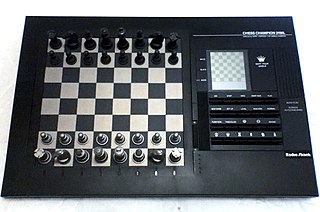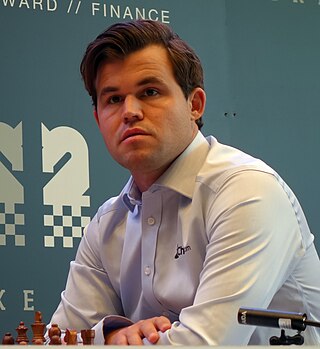The Computer Olympiad is a multi-games event in which computer programs compete against each other. For many games, the Computer Olympiads are an opportunity to claim the "world's best computer player" title. First contested in 1989, the majority of the games are board games but other games such as bridge take place as well. In 2010, several puzzles were included in the competition.

Computer chess includes both hardware and software capable of playing chess. Computer chess provides opportunities for players to practice even in the absence of human opponents, and also provides opportunities for analysis, entertainment and training. Computer chess applications that play at the level of a chess grandmaster or higher are available on hardware from supercomputers to smart phones. Standalone chess-playing machines are also available. Stockfish, Leela Chess Zero, GNU Chess, Fruit, and other free open source applications are available for various platforms.

Sven Magnus Øen Carlsen is a Norwegian chess grandmaster. Carlsen is a five-time World Chess Champion, five-time World Rapid Chess Champion, the reigning eight time World Blitz Chess Champion and the reigning Chess World Cup Champion. He has held the No. 1 position in the FIDE world chess rankings since 1 July 2011 and trails only Garry Kasparov in time spent as the highest-rated player in the world. His peak rating of 2882 is the highest in history. He also holds the record for the longest unbeaten streak at the elite level in classical chess at 125 games.

In computer chess, a chess engine is a computer program that analyzes chess or chess variant positions, and generates a move or list of moves that it regards as strongest.

HIARCS is a proprietary UCI chess engine developed by Mark Uniacke. Its name is an acronym standing for higher intelligence auto-response chess system. Because Hiarcs is written portable in C, it is available on multiple platforms such as Pocket PC, Palm OS, PDAs, iOS, Microsoft Windows and Mac OS X.

David Neil Laurence Levy is an International Master of chess who plays for Scotland, and a businessman. He is noted for his involvement with computer chess and artificial intelligence, and as the founder of the Computer Olympiads and the Mind Sports Olympiads. He has written more than 40 books on chess and computers.

Fast chess, also known as speed chess, is a type of chess in which each player is given less time to consider their moves than classical chess time controls allow. Fast chess is subdivided, by decreasing time controls, into rapid chess, blitz chess, and bullet chess. Armageddon chess is a variant of fast chess with draw odds for black and unequal time controls, used as a tiebreaker of last resort.
World Computer Chess Championship (WCCC) is an event held periodically from 1974 to 2024 where computer chess engines compete against each other. The event is organized by the International Computer Games Association. It is often held in conjunction with the World Computer Speed Chess Championship and the Computer Olympiad, a collection of computer tournaments for other board games. Instead of using engine protocols, the games are played on physical boards by human operators.
Hydra was a chess machine, designed by a team with Dr. Christian "Chrilly" Donninger, Dr. Ulf Lorenz, GM Christopher Lutz and Muhammad Nasir Ali. Since 2006 the development team consisted only of Donninger and Lutz. Hydra was under the patronage of the PAL Group and Sheikh Tahnoon Bin Zayed Al Nahyan of Abu Dhabi. The goal of the Hydra Project was to dominate the computer chess world, and finally have an accepted victory over humans.

Zappa, Zap!Chess or Zappa Mexico, is a UCI chess engine written by Anthony Cozzie, a graduate student at the University of Illinois at Urbana-Champaign. The program emphasizes sound search and a good use of multiple processors. Earlier versions of Zappa are free and the current version is available at Shredder Computer Chess.
Fruit is a chess engine developed by Fabien Letouzey. In the SSDF rating list released on November 24, 2006, Fruit version 2.2.1 had a rating of 2842. In the CEGT rating list released on January 24, 2007, Fruit version 2.2.1 had a rating of 2776.

Rybka is a computer chess engine designed by International Master Vasik Rajlich. Around 2011, Rybka was one of the top-rated engines on chess engine rating lists and won many computer chess tournaments.

The 37th Chess Olympiad, organized by FIDE and comprising an open and a women's tournament, as well as several other events designed to promote the game of chess, took place between May 20 and June 4, 2006, in Turin, Italy. There were 148 teams in the open event and 103 in the women's event. In total, 1307 players were registered.

Vasik Rajlich is an International Master in chess and the author of Rybka, previously one of the strongest chess playing programs in the world.

Ikarus is a computer chess program created by brothers Munjong and Muntsin Kolss.
The International Paderborn Computer Chess Championship was an annual chess tournament for computer chess programs held from 1991 until 2007. It was organized by the University of Paderborn. The fifth edition in 1995 was also the 13th edition of the World Microcomputer Chess Championship.

A chess tournament is a series of chess games played competitively to determine a winning individual or team. Since the first international chess tournament in London, 1851, chess tournaments have become the standard form of chess competition among multiple serious players.

Don Dailey was an American researcher in computer chess and a game programmer. Along with collaborator Larry Kaufman, he was the author of the chess engine Komodo. Dailey started chess programming in the 1980s, and was the author and co-author of multiple commercial as well as academic chess programs. He has been an active poster in computer chess forums and computer Go newsgroups. He was raised as a Jehovah's Witness and served in recent years as an elder in the church of Roanoke.
Jonny is a computer chess program written by the German mathematician and programmer Johannes Zwanzger.

The World Chess960 Championship is a match or tournament held to determine a world champion in Chess960, a popular chess variant in which the positions of pieces on the players' home ranks are randomized with certain constraints. Prior to 2019 FIDE did not recognize a Chess960 world champion or sponsor regular tournaments in the format, but the Chess Classic at Mainz and other non-FIDE affiliated organizations have hosted high-profile Chess960 tournaments and matches. Time controls for Chess960 are non-standardized, and usually conform to the wishes of the tournament sponsor or organizer. As a result, Chess960 championships have been held with irregular time controls ranging from rapid (Mainz) to blitz and bullet.









